Without getting into any of the rights or wrongs about the Russia/Ukraine situation or getting into history lessons (or any of the arguments than can be made by either side), has it struck anyone how *odd* a lot of this situation has been?
So odd at times that it’s made me wonder: how much of this is staged theatre?
Not that the invasion into Ukraine isn’t real: it’s clearly happening. And, as an anti-war person, I should make clear I’m morally against any nation being invaded militarily by another – and, most of all, against innocent civilian populations being subjected to devastation and potential loss of life.
But there’s something about the way this has all unfolded that doesn’t quite seem to be adding up: and has left me with questions.
After all, the notion of Russian military incursions into Ukraine is not something sudden or unforeseen: it’s been on the cards for a very long time, with the annexation of Crimea having already laid the foundation several years ago.
And Putin’s main pretext for invasion – NATO’s broken promise not to move towards Ukrainian assimilation – has been established for ages.
Everyone knew – and has always known – what the red lines are and what the likely outcomes would be.
What struck as odd were the claims by Western officials (particularly Joe Biden), for example, that Russia was going to invade on various specific dates – they kept changing the date, but the last date cited was the 18th February.
Why did they keep specifying a date for invasion? Doesn’t that just lose you credibility when said date comes and goes without the invasion? Yes, Putin did order the incursion eventually – but not on the dates that were being predicted.
Or was this specifying of dates a ploy to embarrass Putin into backing off? Or, conversely, was it a ploy to goad Putin into action? Either way, it seemed a strange thing to keep saying: why not just stick to ‘we believe an invasion is imminent’ and leave it at that?
This strange business of predicting the date for Russian invasion got so silly that Bloomberg had to apologise for announcing Russia had invaded Ukraine – weeks before it actually happened (see picture below).
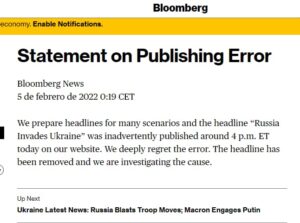
But Western officials repeatedly predicted the impending Russian invasion: while, simultaneously, reporters inside Ukraine and Kiev were reporting a total lack of concern or panic on the part of Ukrainians. Hadn’t they gotten the memo – that all hell was about to break loose?
In fact, some Ukrainian politicians even criticised Western media and officials for trying to cause panic: implying either that the Ukrainians were trying to downplay the situation or that the Western media was manufacturing a narrative ahead of the reality.
It’s possible that Ukrainians are just so used to the ongoing state of tension by now that they simply don’t react too strongly. But it was strange that it was Western media that was running dramatic items about imminent Russian invasion, while Ukrainian media – and politicians – were apparently being more calm about it.
Sources inside Ukraine have also explained that the Russian military build-up has been going on since March of last year: the international media and the Western officials only started talking about it in January this year. It could just be a case of capricious news cycles: but why wasn’t the build-up being talked about long before January?
A suspicious mind might think it’s almost as if both the foreign media and the Russian government itself were working to a timetable of some sort.
And, yes, this could be just me being too cynical: but something has felt very scripted and choreographed about this whole sequence of events.
President Biden, meanwhile, kept predicting the imminent invasion (and he has also predicted Russian forces will push all the way to Kiev – even though Putin has stated he has no interest in occupying the whole country) while also making it apparent that neither the US nor NATO allies had any intention of intervening militarily: Western response would be limited only to sanctions.
And even the sanctions issue itself is curious. Because – and in keeping with the notion of a somewhat scripted or overly choreographed situation – Vladimir Putin himself doesn’t appear to have been sanctioned.
Which is odd: and inconsistent with the present Western rhetoric. Why would Biden make such a point of sanctioning various Russian interests in response to the invasion – but not sanction Putin himself? This question is raised here by ABC News. And other commentators in the mainstream press have also noted that the sanctions being imposed seem very unlikely to hurt Putin.
This clear telegraphing of the limited US/Western response to the invasion almost seems like it was a green-light for Russian forces to go ahead with their plans.
It seems as though Putin was watching to gage what the Western reaction was going to be – and when he saw how limited the response was going to be, he took it almost as a permission of sorts to proceed.
This would explain why Russia first made it so obvious that it was moving its forces into position: but yet also continued to discuss pulling back and negotiating. Putin seemed to be telegraphing his plans, waiting and then keeping his options open – testing the waters to see how things were going to play out.
And then Western officials essentially said ‘Russia is about to invade: but we’re not going to do anything’.
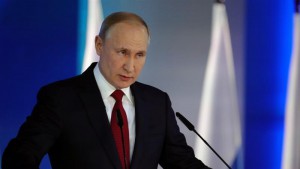
Which raises the question: were we goading Putin into going ahead with an invasion?
One does have to wonder about these things.
The classic example that always comes to mind is the Iraqi invasion of Kuwait in 1990 – which was the trigger for the first Gulf War. It is now known that the Bush administration’s ambassador had implied to Saddam Hussein that the US would not get involved if Iraq moved troops into Kuwait. Saddam, who had until this point been a key US ally in the region, has thus perceived a green light from the US to go ahead with an incursion: and of course, contrary to what he’d been led to believe, the US attacked Iraq in response.
Clearly, the big difference here is that Putin is not a US ally: and the West has issued nothing but condemnation for all Russian actions in Ukraine from 2014 until now. But you still have to wonder what goes on behind closed doors: and what kind of signals are communicated or intimated via various channels and means.
More curious yet, as late as 21st February, the White House – as reported by The Washington Post – seemed unsure whether Russia had invaded Ukraine or not: or, more to the point, unsure of whether what Russia was doing constituted an invasion or not. This was despite various news agencies and media outlets already having declared by now that Russia had indeed ‘invaded Ukraine’.
And, just as odd, why did Western media and officials start predicting Russian ‘false flags’ as early as mid January?
We can suppose that this calling out of ‘imminent’ false flags was a way to diminish Russia’s supposed false pretexts for invasion ahead of time. But it’s very unusual for one government to call out another government’s false flag operations – especially ahead of time. It very rarely happens: various governments seem to have had an unspoken agreement in the past to not call out false flag ops – and, in fact, to not use the language of ‘false flags’ at all.
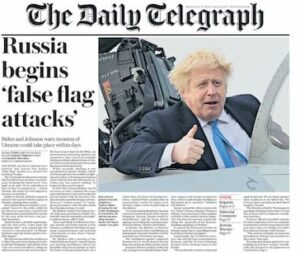
Governments in general don’t like to use terms like ‘false flag’ or refer to false flag operations: because even acknowledging the existence of false flags invites domestic audiences to wonder about the true nature of too many events (and it also has the undesired effect of allowing perceived ‘conspiracy theorist’ language into the mainstream media lexicon).
Rather amusingly, some mainstream news outlets actually had to publish articles explaining to readers what a false flag even is: such as this piece in The Independent (‘Ukraine: What is a False Flag Operation?‘). But that’s because talking about such things has been the purview of independent and alternative sites and blogs (such as this one: false-flag archive here) for years and something the MSM has steered clear of until now.
Even the BBC, in a report from January 14th, noted that it was ‘unusual for the US to go public with such specific intelligence determinations.’
Only now has this seemed to have changed: with even Boris Johnson casually calling, for example, the kindergarten shelling incident a Russian false flag designed to act as justification for Russian invasion.
Moreover, having already had these potential ‘false flag’ ops called out in advance, why did Russia go ahead and carry out the ‘false flags’ anyway? Wasn’t that kind of stupid?
And they were probably false flags. While it’s possible Ukrainian forces were behind the recent incidents, it’s also more likely that these were carried out by Russian agents and designed to be blamed on Ukrainian forces. And it was probably to convince the domestic Russian audience of the justification for the incursion. It would be incredibly stupid of Ukrainian forces to commit these acts, knowing that a build-up of Russian troops was already amassed on the border.
But it’s still odd.
Putin didn’t need additional pretexts like poorly executed false flag operations: he has already claimed, for example, that a genocide is being carried out against Russians in the Donbass (which, although there has absolutely been mass violence and killing on both sides since 2014, seems unlikely to be true in the strict sense of the word ‘genocide’: discrimination and violence, yes, but there appears to be no clear evidence of ‘genocide’).
We should note, however, that Russia has filed documents with the UN, apparently providing evidence of this ‘genocide’ against ethnic Russians in Donbass: I don’t know what’s in those documents or if or when the content of those documents might be made known.
The point being that, if Putin’s support base is already convinced that a ‘genocide’ has been committed against ethnic Russians or Russian speakers, then surely that would’ve been pretext enough – without the need for badly-managed false flag incidents.
But did Western sources predict the Russian ‘false flags’ in advance precisely so that the Russians *couldn’t* accuse the Ukrainians of the attacks when the attacks happened? Or did they think the Russians would refrain from the false-flag operations once they’d already been called out ahead of time?
As is so often the case these days, it’s nearly impossible to actually tell what’s really gone on: because we don’t really have ‘information’ – only information warfare: whether its from the Russian propaganda side or the Western propaganda side.
All that seems to be clear at this point is that Russian forces have invaded Ukraine and are violating its sovereignty.
To be clear, I am not a Putin apologist. And I am entirely an anti-war person. One nation invading another by force is never okay: especially when there doesn’t appear to be a clear reason why such an action was urgently necessary,
But the point here is… how much of this is staged theatre?
Arguments in the media suggesting that Putin is ‘trying to recreate the Soviet Union’ seem more like propaganda than analysis: this is the same Putin, after all, who at one point was interested in Russia *joining* NATO.
Certainly *some* of this is theatre: for example, aside from the strategic reasons to invade Ukraine, Putin no doubt considers this military action (ostensibly on behalf of ethnic Russians or Russian speakers) a powerful way to bolster domestic support and maybe to engender a fresh wave of patriotic feeling inside Russia.
But what about *outside* of Russia? Did some elements in the West *want* Russia to invade Ukraine? Has Putin simply taken the bait? Would that explain the strange way this state of affairs has developed?
It’s just a question being posed here: I’m not drawing conclusions.
We also know that, as of 2019, Ukraine’s ambition to join NATO was enshrined into the constitution: how far down the line towards membership they are is unclear, as is the question of whether NATO even wants Ukraine to join any time soon. But obviously this alone would’ve been a trigger for Putin to want to take action.
The Kiev government obviously knew this would provoke a response from Russia: as did NATO. And it isn’t as if Putin himself hasn’t been openly warning us about this for years.
One possibility is that we have been goading Putin and Russia into a situation that is potentially going to backfire on him and even be disastrous for Russia in the long run. After all, the underhanded role of Western agencies in the events of 2014 and beyond are fairly well known at this point, including the support for certain far-right Ukrainian militias in their fight against the Russian backed Separatists.
Both the Russians and the West have been guilty of devious machinations in Ukraine, with Ukraine and its population being used as a pawn in the ongoing geopolitical struggle: and what was the desired outcome supposed to be? Surely the only two possible outcomes were a full assimilation of Ukraine into the Western sphere of influence (up to and including the red line of NATO membership), which would inevitably provoke a drastic response from Russia: or a preemptive Russian incursion into Ukraine to secure Russia’s borders.
Either way, it seems as if further conflict of some description was inevitable: and it’s possible that Putin has simply decided to play his hand and get it out of the way, to see what happens.
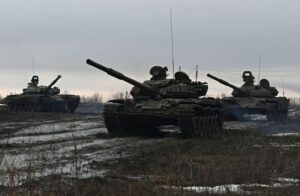
But in terms of Western powers possibly *wanting* Putin to invade Ukraine, there are two motives that immediately spring to mind as possibilities. The first, again, is that Putin’s gambit is going to backfire and the Russian engagement in Ukraine is going to be costly for both Putin and Russia, with Russian resources being stretched and Russian forces getting bogged down.
The second – although it could go hand-in-hand with the first – is that someone is looking to create a further destabilisation scenario in the region. This is something I’ve covered at length before: how, for example, the Neo Nazi ‘Azov Battalion’ in Ukraine has been nurtured as a kind of ‘white jihad’ version of ISIS. Just as ISIS was nurtured and developed in Iraq and Syria with the assistance of intelligence agencies and was allowed to become an international problem beyond their immediate battlefields, the Azov Battalion in Ukraine (which stands accused of various war crimes) has already been exposed to have links with white power movements outside of Ukraine, including links to the organisers of the controversial Charlottesville rally a few years ago and to the man who carried out the Christchurch massacre in New Zealand.
I predicted years ago (again, see here to explore those details) that the situation in Ukraine would be used to create a Syria-type scenario in Europe: both for the destabilisation of Russia and for the potential destabilisation of Europe. If Russia’s military operation in Ukraine gets dragged out for a long time, the conditions could be perfect for far-right militias and Neo Nazis like the Azov Battalion to wage a protracted war and expand its operations, even drawing in far-right or Neo Nazi recruits from all over Europe – the same way that the so-called Islamic State group drew in wannabe jihadists from all over the world who flocked to Iraq and Syria.
Again, as explored here, this was already happening, going back to 2014: with foreign volunteers going over to Ukraine to join the militias, especially the Azov Battalion. This was in fact something the Russians had complained about to various governments – who were allowing their citizens to go into Ukraine and essentially act as mercenaries (mirroring the Syrian government’s complaints about foreign and European fighters flooding into Syria).
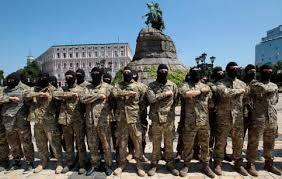
Again, that is the nightmare scenario I’ve been worrying about for years: and *if* this Russian invasion of Ukraine has been ‘allowed’ to happen in some kind of scripted way (which, again, is only a speculation on my part), this eventual state of affairs could well be one of the long-term intelligence-community objectives: to create a new powder-keg, albeit this time in Europe instead of Libya or Iraq/Syria.
Putin, in his most recent speech, in fact explicitly referred to the ‘Nazis’ in Ukraine, implying that a major objective of Russia’s operation in Ukraine is to eliminate these militias (the term ‘denazification’ is even used in the NBC piece cited above): while it’s just as likely that he is using the ‘Nazis’ as an excuse to pursue broader Russian strategic interests (the scale of the Neo Nazi problem in the Ukrainian militias has never been clear: even though their general existence has been indisputable), it also suggests Putin sees the extremists as a long-term threat to Russia and to ethnic Russians – much the same way that extreme jihadists were seen as a palpable threat both by Gaddafi and Assad.
None of this necessarily justifies an outright military invasion into a sovereign nation – which is a breach of international law.
But it is at least some of the explanation: Russia rightly sees the foreign-backed Neo Nazi militias as a threat, just as Gaddafi and then Assad saw the foreign-backed jihadist militias as a threat. And Putin has said for several years now that the nurturing and spreading of extreme militias as proxy tools was something he wasn’t willing to tolerate: it was one of the reasons Russia militarily intervened in Syria.
But whatever Putin’s ultimate objectives are, and whatever the Western powers are ultimately hoping will happen, there still seems to be something strange about the manner in which this has unfolded.
And why did he specifically decide to make these moves *now*? Why didn’t Russia take this action a year ago or two years ago – when Donald Trump was US President? Wouldn’t that have made more sense? If Trump’s non-reaction to Turkey’s invasions into Syria were anything to go by, Putin and Russia would’ve been better served taking action two or three years ago.
It’s possible that Russia saw this specific period in time as a good moment to act because most of the West is dealing with the consequences of the COVID pandemic and there is also general political disunity in Europe, the US and the West: with the West’s resolve apparently at its weakest. It might be as simple as that.
Either way, the way Western officials have responded to this situation – both before and after the Russian incursion – has seemed modulated to communicate that Russia could engage in measured actions (or violations) in Ukraine and not face armed engagement from any external forces.
Again, almost as if they were telling Putin he might as well go ahead with the operation.
The West’s own ‘red line’ – one would imagine – would be if Russia later goes further and attempts to go all the way to Kiev. More worrying is the fact that Biden has said he expects Russia to push all the way to Kiev – even though Putin has said that isn’t his objective.
Which makes one wonder if Biden and co are in fact further goading Putin and Russia to push on with a full invasion and occupation of Ukraine. If Putin thinks he can get away with pushing on to Kiev and installing a pro Russian government, there’s every chance he’ll do that. Because what would be the point of *not* doing that if Russia has already come this far – and the Western governments have already expressed that their response will be limited to sanctions?
Again, none of this is intended as a defense of Putin or a justification for the Russian operation. But, at the same time, the way a lot of the Western media is portraying Putin as a comic-book supervillain – and the operation in Ukraine as having been entirely unprovoked – is also a misrepresentation of the events of the last several years.
And understanding that there have been crimes and provocations committed by both sides of the equation in the last several years is important: and this is something most of the major media hasn’t been doing.
We’ll have to wait and see how things unfold, of course. And hope that the ordinary citizens of Ukraine find a way through this nightmare without loss of life. War is almost always bullshit: and the price too high.
But these are simply questions I’m asking and speculations based on things that don’t seem to add up about the way this situation has unfolded.

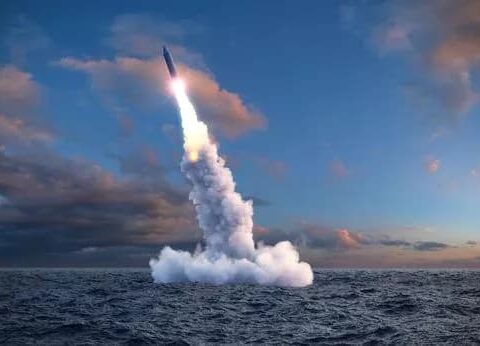

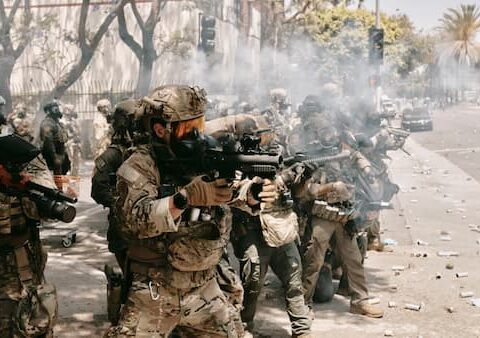
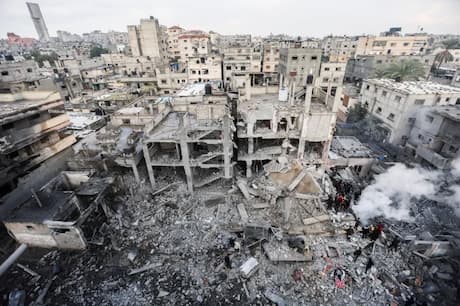
Thanks for the article, and thanks for keeping making them! Always looking forward to new ones! (On another note: the ‘join the mailing list’ button does not work). Greetings!
Hi Smoothsailing: good to hear from you again. I’m sorry about the mailing list issues. I’m going to look into it.
You mentioned interesting points. An article worth reading, thank you! By the way, one of the things that caught my eye, “Arguments in the media suggesting that Putin is ‘trying to recreate the Soviet Union’ seem more like propaganda than analysis: this is the same Putin, after all, who at one point was interested in Russia * joining NATO.” partial.
I found Russian version of this conversation with David Frost, and I’ve read it. It is on the Kremlin ru site, but it is difficult to open, let me specify in advance. What I’ve understood from the part about NATO was not that Putin was interested in joining NATO, but that it was not possible to enter NATO on equal terms in an organization under American hegemony. In other words, he could think “even if I say this, I will throw the ball across, since I will not receive a membership on equal terms from the other party in any way.” There are some mistakes in this translation which I have seen, I’ve read the English version from the section on the BBC, it is shown as if Putin is a fan of the west.
In BBC, Putin: “Russia is part of the European culture. And I cannot imagine my own country
in isolation from Europe and what we often call the civilised world.”
In Kremlin ru, Putin: “Russia is part of European culture, and I cannot imagine my own country apart from Europe and from, as we often say so-called civilized world.
Besides, while Putin is targeting Soviet Russia so much, in almost all his speeches, the west still makes it seem like he is trying to rebuild the Soviets? It’s really funny. I think Putin can be dreaming of Tsarist Russia, but since the Soviet experience is much closer to today, and socialism is what the west fears most, both sides are working for the others benefit. It may not be funny, but it is a candidate to be tragicomic that the peoples of the world are too deaf to hear words of Putin’s persistently targeting the Soviets and people are stupid enough to believe the media propaganda.
You’re certainly right that what we are seeing is staged theater.
I think I may have sent you this link before, but it seems a good time to resend it. This is as good an explanation of events we are seeing play out as any I’ve read. It was written 8 years ago.
http://redefininggod.com/the-rockefeller-plan-for-the-brics-new-world-order-in-their-own-words/
Take care,
Tony
Excellent, thanks Tony.
Excellent review.
‘We’ll have to wait and see how things unfold, of course. And hope that the ordinary citizens of Ukraine find a way through this nightmare without loss of life. War is almost always bullshit: and the price too high.’
Yes.
Take y care.
Tk y S. Awan